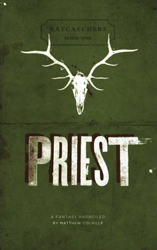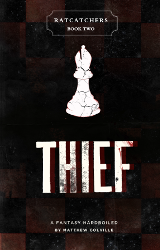A quote I’ve heard attributed to many people, but in this case I cite Alfred Hitchcock, is “If you want to be universal, be specific.”
Guillermo Del Toro places his fairy tale story of skepticism and fascism in Spain, 1944, just after the Spanish Civil War and, in doing so grounds his story in specifics, freeing his fantasy to be universal.
As with all fairy tales, there is a moral here. A subversive one. Whereas most fairy tales extol the virtues of honesty, obeying your elders, not straying from the path, Pan’s Labyrinth’s moral is about thinking for yourself, disobeying authority. No surprise, then, that the film is set in post-Civil War fascist Spain. The movie is about fascism. The fascism of totalitarian governments, and the fascism every child experiences at the hands of their parents. Parents who issue apparently arbitrary orders and expect them to be thoughtlessly carried out for one’s own good.
But, as the movie directly states, only a certain type of person can follow orders for the sake of following orders. And while adults in the film struggle with fear as they try to rebel, childhood is the natural antithesis of fascism.
12-year-old Ofelia, our main character, is therefore well-armed to oppose the murderous reign of her cruel stepfather, Captain Vidal. Both a tyrannical father and a literal fascist. When the local guerrilla revolutionaries move into the forest, Captain Vidal has moved his trooped into the forest and turned a farmer’s mill into a garrison. No coincidence that our fairy tale begins with our hero entering the forest.
Ofelia’s mother arrives, child in tow. Her husband is dead, and she is pregnant with Captain Vidal’s child. Was Captain Vidal involved in the husband’s death? Oh, probably. You know how these things go. But Ofelia’s mother seems genuinely happy that they are coming to live with the Captain, because it means security. She will be taken care of. She tells Ofelia; “The captain has been so good to us.… Please, Ofelia, call him father. It’s just a word, Ofelia, just a word.”
And here we have our first inkling of what this movie is going to be about. Ofelia simply refuses to do it. She never does it. She knows she’s never going to do it as soon as her mother asks, and we can tell! This young actress is astonishing in her ability to play wide-eyed wonder, and skepticism, and determination, often without resorting to dialog. We can tell what she’s thinking. Lots of movies never reach that level of writing and acting, with adult actors!
She’s not a perfectly moral hero, the movie does not argue that childhood means perfectly moral innocence, or that innocence is a virtue. Ofelia lies. She disobeys her mother. There are several points in the film where Ofelia forces herself to do some really unpleasant (as in, gross) things because she was promised she’d be made a princess if she did. And in those moments, she steels herself, reminds herself how badly she wants to be a princess, and soldiers on. It’s, frankly, adorable to watch precisely because of how selfish it is. “I am going to be a princess, even if I have to slog through all this mud and end up covered in beetles.”
But it does argue that childhood affords a purity of thought denied to us adults. We cannot want something so purely, or believe things as strongly as a child, and this is part of Ofelia’s defense against fascism.
It’s clear early on when Ofelia begins to experience some magical, possibly imaginary, things. When she encounters a fairly disgusting bug, remember this is the same guy who made Cronos, she says; “Hi! Are you a fairy?”
Is it a fairy. No! It’s a bug! But that Ofelia can see something so ugly and imagine that it’s a wondrous fairy is another one of her virtues and, possibly because of her belief, we see the bug become a fairy, and the adventure begins.
She meets a small cast of interesting and terrifying characters. The titular Faun at the center of the titular labyrinth informs her that she is the reincarnation of a princess and if she can pass three tests her father the king will take her away from it all and she’ll rule over fantasyland.
Of course, if we’ve been paying attention, we know Ofelia is going to disobey virtually every instruction the Faun gives her. She’s like the Fairy Tale version of John McClane from Die Hard. She gets her ass kicked at every turn, and wins all the way through.
She is not burdened with any adult baggage. When we see the Faun, he appears a diabolic and sinister character. I would have got the hell out of there, or looked for a shotgun. Ofelia may be afraid, but she remembers her manners, like a good girl. “My name is Ofelia. What’s yours?”
When confronted with the gigantic frog at the bottom of the world, she is disgusted, but articulate. “Aren’t you ashamed to live down here, in all the mud, eating nothing but bugs?”
This is not movie dialog, it’s fairy tale dialog, and it’s delightful. There’s more fairy tale plotting. When Ofelia (astonishingly played by Ivana Baquero,) has carefully and wisely chosen to remove the new and expensive dress her mother made for her, so it will not get dirty as she explores the Underworld, we know something bad is going to happen to the dress. It’s going to get ruined, and she’s going to get in trouble, in spite of the fact that she TRIED to keep it nice, and was thinking ahead and being responsible, and we know no one will believe her. Fairy tales used to teach children that the world was going to be an awful and capricious place. Unfair, and rarely unfair in our favor.
It should be no secret that Ofelia’s fantasy world, and the cruel reality of Captain Vidal, the Evil Stepfather, are going to collide. At most, only one can survive.
Ofelia is not the only character who struggles against Captain Vidal, and the plight of the Spanish peasants to deal with the autocrat is dark, and violent and not what we associate with a fairy tale. But in spite of its brutality and violence, I thought…if I had a six year old daughter…I might take her to see this. Because it works as an amazing fairy tale, with lessons about the world, one of which is; people can be horribly cruel to one another. That’s what fairy tales used to be about. Horrible lessons for children, wrapped in fantasy. Maybe I’d scar my daughter for life, or maybe she’d come out of the experience with a healthy and deep-seated distrust for authority, and people who obey orders for order’s sake.

 My first novel
My first novel My new novel.
My new novel.